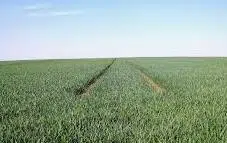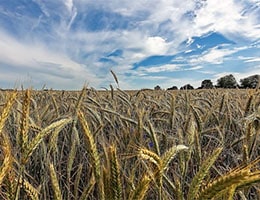 A single crop or one that is predominant in a certain territory is called monoculture . This is the plant species that monopolizes all or most of the cultivated land in a region.
A single crop or one that is predominant in a certain territory is called monoculture . This is the plant species that monopolizes all or most of the cultivated land in a region.
Monocultures are usually very extensive plantations of the same species . Because they rely on a single cultivation method (with one type of fertilization, the same mechanism to control pests, etc.), monocultures bring efficiency to large-scale production.
Cotton , soybeans , corn , pine and eucalyptus are some of the species that are usually planted in monocultures. Although the practice may be convenient from an economic point of view, it generates significant ecological damage, degrading the soil and causing it to progressively lose its fertility.
Monoculture, in short, is chosen by producers since it favors mass production with reduced prices by weight or volume, helps to rationalize tasks and requires little labor. Faced with these benefits obtained by those who develop the crops, the practice causes problems for the environment because it threatens biodiversity and promotes erosion due to soil overload, among other negative issues.
Let's see below an extensive list of the benefits and advantages that monoculture offers farmers:
* allows us to obtain products such as cereals and other foods essential for our economy in massive quantities;
* production costs are lower than with alternatives, and this point makes it especially tempting, even despite the worst of its disadvantages;
* makes plant disease control considerably easier;
* benefits the industry because it uses a large number of mechanized devices in the production process;
* The previous point relates to the payment of salaries, which is considerably lower since not as much labor is needed;
* Domestic market prices become more accessible.
On the other hand, let's look at some of the main disadvantages of monoculture in more detail:
* since uniform crops have a greater susceptibility to harmful agents or pathogens, monoculture increases the chances of diseases and pests spreading in a very short time;
 * when complications such as a drought occur, producers are at especially great risk, since they do not have other planted products to sell in place of those that spoil;
* when complications such as a drought occur, producers are at especially great risk, since they do not have other planted products to sell in place of those that spoil;
* the soil of a land destined for monoculture erodes and cracks, which causes its degradation;
* if you are in a tourist area, the landscape is affected and this can have a negative impact on the tourism industry ;
* the large amount of the same food and the scarcity of predators promotes the reproduction of certain insects, which become pests;
* Competition between companies can be really fierce, with unfair tactics such as the appropriation of other people's clients or defamation;
* since labor is not so necessary, monoculture increases the unemployment rate;
* The poorest quality products are not exported or sold, but rather become a surplus that usually entails great economic losses.
Perhaps the greatest consequence of monoculture is the mistreatment of the soil, the exhaustion it suffers from not receiving a balanced and slow use, since its nutrients are consumed voraciously and there is no time to replace them.
It should be noted that the opposite of monoculture is polyculture . This is the name given to agriculture that uses different crops on the same land. Polycultures, unlike monocultures, adopt a dynamic similar to that of the natural ecosystem. Association and crop rotation are two common forms of polyculture development.
